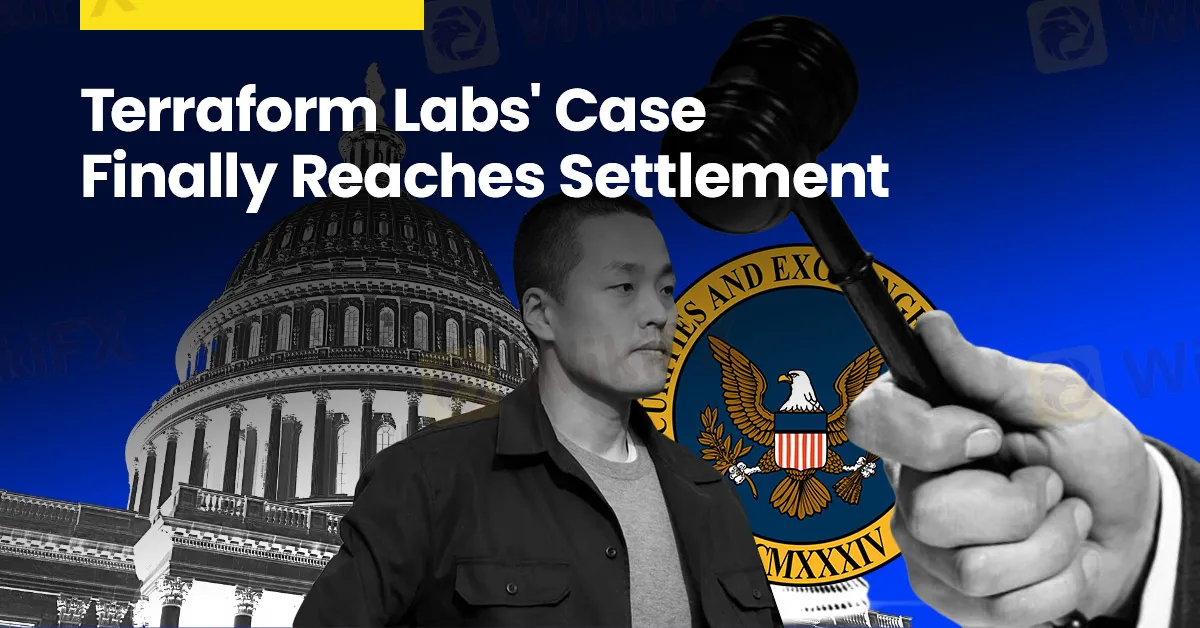简体中文
繁體中文
English
Pусский
日本語
ภาษาไทย
Tiếng Việt
Bahasa Indonesia
Español
हिन्दी
Filippiiniläinen
Français
Deutsch
Português
Türkçe
한국어
العربية
Terraform Labs' Case Finally Reaches Settlement
Abstract:Terraform Labs and its founder, Do Kwon, have settled with the US Securities and Exchange Commission (SEC) following accusations of fraud linked to the collapse of the stablecoin TerraUSD. This agreement, disclosed on a court website, follows an April jury finding that held Kwon and Terraform Labs responsible for civil fraud charges.

Terraform Labs and its founder, Do Kwon, have reached a settlement in principle with the U.S. Securities and Exchange Commission (SEC) to resolve civil fraud charges stemming from the collapse of the stablecoin TerraUSD (UST), according to a court filing. This follows an April jury verdict finding Kwon and Terraform Labs liable.
The SEC had alleged that Kwon and Terraform misled investors about UST's stability, a crypto asset designed to maintain a 1:1 peg with the US dollar. Additionally, the SEC claimed Terraform misrepresented the use of its blockchain technology in a popular Korean mobile payment app.
The settlement terms remain confidential, but it signifies a significant development in the ongoing legal saga surrounding Terraform Labs, Do Kwon, and the SEC. U.S. District Judge Jed Rakoff has requested both parties submit supporting documentation by June 12, 2024.
Previously, the SEC sought substantial penalties, including the disgorgement of $5.3 billion in alleged ill-gotten gains from UST sales, hefty fines, and a ban on Kwon and Terraform Labs from participating in the crypto securities market.

The May 2022 implosion of UST and its associated token, Luna, triggered a major downturn in cryptocurrency markets, inflicting an estimated $40 billion in investor losses. While the SEC charges have been settled, Kwon still faces criminal accusations in both the US and South Korea. He maintains his innocence.
A recent development has emerged in Kwon's extradition case. Montenegro's Court of Appeal has remanded the case back to the High Court for retrial, following concerns raised by Kwon's legal team regarding the validity of the initial ruling.
The Court of Appeal accepted Kwon's legal arguments, overturning the High Court's April 8, 2024 decision that authorized his extradition. The initial ruling drew criticism for lacking concrete evidence and sufficient reasoning. In the retrial, the High Court must ensure Kwon's extradition consent is voluntary, informed, and irrevocable.
The US has filed eight charges against Kwon and expressed willingness to proceed with his prosecution in absentia. Following the 2022 TerraUSD/Luna collapse that wiped out nearly $37 billion in crypto market value and triggered numerous company failures, Kwon initially vanished from public view before his arrest in Montenegro.

Disclaimer:
The views in this article only represent the author's personal views, and do not constitute investment advice on this platform. This platform does not guarantee the accuracy, completeness and timeliness of the information in the article, and will not be liable for any loss caused by the use of or reliance on the information in the article.
Read more

Malaysia Pioneers Zakat Payments with Cryptocurrencies
Malaysia has taken a significant step in modernising religious practices by becoming the first country to enable zakat payments through digital assets.

21 Arrested in Telangana Cryptocurrency Scam
Telangana Police arrests 21 in a cryptocurrency scam. Cybercriminals extorted money, laundered ₹8.2 crore, and transferred it via wallets linked to Dubai.

Two Californians Indicted for $22 Million Crypto and NFT Fraud
Gabriel Hay & Gavin Mayo indicted for $22M crypto fraud. Learn about the Vault of Gems scam and how to avoid NFT rug pull schemes.

Russia to Fully Ban Crypto Mining in 10 Regions Starting January 1, 2025
Starting from January 1, 2025, Russia will implement a comprehensive ban on cryptocurrency mining in 10 regions for a period of six years. The ban will remain in effect until March 15, 2031.
WikiFX Broker
Latest News
AIMS Broker Review
The Hidden Checklist: Five Unconventional Steps to Vet Your Broker
YAMARKETS' Jingle Bells Christmas Offer!
Why is there so much exposure against PrimeX Capital?
Russia to Fully Ban Crypto Mining in 10 Regions Starting January 1, 2025
Two Californians Indicted for $22 Million Crypto and NFT Fraud
WikiFX Review: Is Ultima Markets Legit?
Colorado Duo Accused of $8M Investment Fraud Scheme
MTrading’s 2025 "Welcome Bonus" is Here
Malaysia Pioneers Zakat Payments with Cryptocurrencies
Currency Calculator


